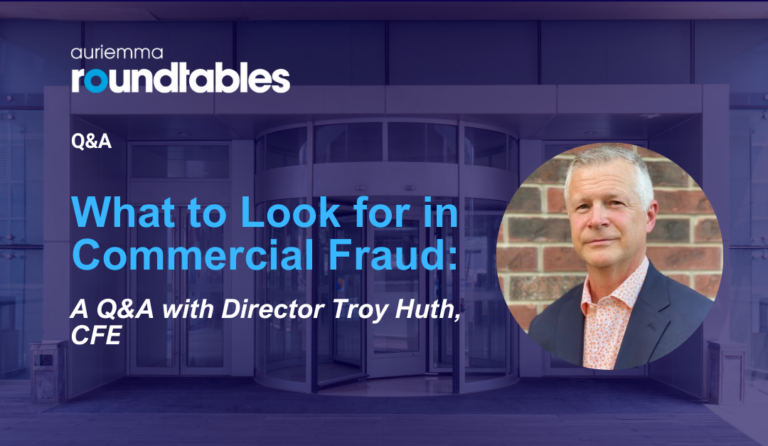May 30, 2024
The Top Challenges Facing Banks’ Deposit Risk Executives Right Now
Regulatory and account authentication challenges are front of mind for leaders in the deposit risk function.
Auriemma Roundtables’ newest group, Deposit Risk, is focused on arming executives in this burgeoning function with peer insights and intelligence.
“Navigating the evolving landscape of deposit risk management requires a deep understanding of regulatory changes, sophisticated risk management strategies, and robust KYC processes,” said Troy Huth, director of the Deposit Risk Roundtable. “As deposit risk executives grapple with these challenges, peer insights and industry intelligence become invaluable.”
Here are the top current and emerging issues on deposit risk executives’ minds:
Uncertain regulatory environment around “junk fees”
In January 2024, the Consumer Financial Protection Bureau (CFPB) proposed a rule limiting financial institutions’ ability to charge non-sufficient funds (NSF) fees on transactions declined in real time, such as debit card purchases, ATM withdrawals, and certain peer-to-peer payments. This move, part of an ongoing campaign against so-called “junk fees,” covers banks, credit unions, and some P2P companies. Under the rule, FIs may only charge fees to offset documented processing costs, which the CFPB suggests should be between $3 and $14.
Financial institutions are scrambling to redesign overdraft payment systems to comply with the rule. Many Roundtable members have started to evaluate certain overdraft fees, such as Authorize Positive, Settle Negative (APSN) transaction – instances where the customer had sufficient funds at the point of sale but had insufficient funds by the time pending purchases were processed.
Liabilities in the event NSF fees are curtailed
A 2017 CFPB study found that frequent over drafters accounted for 9% of total consumers – and 79% of combined overdraft and NSF fees. In the wake of this new rule, FIs may need to evaluate potential risks in serving overdraft-prone customers. To prevent losses in this sector from becoming a balance book contagion, banks may consider other measures for checking and debit accounts, such as monthly maintenance fees, fees tied to minimum balance requirements, or charges for services that were previously free, such as ATM usage or paper statements.
First party fraud related to junk fee policing
By capping or eliminating overdraft fees, consumers’ financial disincentive for overdrawing an account significantly diminishes. This could lead to some account holders deliberately overdrawing and then abandoning their accounts. Deposit Risk Roundtable participants have reported a spillover of first party fraud in overdraft balances and are experiencing difficulties ascertaining the root cause of the overdraft (i.e. economic struggle versus abuse.) These factors can comingle into higher credit losses.
Increasingly pressing KYC demands
A persistent rise in third-party check fraud puts significant pressure on financial institutions to enhance their detection and prevention strategies in the account origination process. Concurrently, KYC processes face their own set of challenges, such as identity verification in the face of synthetic identities, leading to banks tightening their approval criteria for new accounts. Banks are forced to balance fraud risk against false positives and increased customer friction.
Meanwhile, banks’ KYC functions are confronting high volumes from bot-driven applications. Members reported implanting high-touch interventions in the account acquisition process, such as outbound verification calls.
Navigating these challenges requires deposit risk executives to stay informed. The evolving regulatory environment, coupled with the need for robust account authentication measures, underscores the importance of continuous learning and adaptation. By participating in Auriemma Roundtables’ Deposit Risk group, executives can leverage peer insights and industry intelligence to develop effective strategies.
About the Deposit Risk Roundtable
The Deposit Risk Management Roundtable provides a platform for consumer deposit portfolios’ risk management executives to identify best-in-class strategies and evaluate the economic environment, technology developments and key industry developments impacting the deposit product.
Membership is open to deposit account providers only. To find out more about membership, contact Zeenat Shah, Director of Sales, at zshah@roundtables.us



